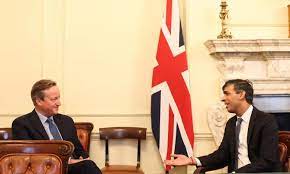Andrew Hammond
Prior to the landmark 2014 Scottish independence referendum, then-UK Prime Minister David Cameron famously commented that, “if you don’t like me, I won’t be here forever. If you don’t like this government, it won’t last forever.” Almost a decade later, with the Conservatives still in power, Cameron was asked on Monday by the current incumbent of 10 Downing Street, Rishi Sunak, to return to office as foreign secretary.
Sunak’s reluctance to give this senior post to any of the Conservative Party’s current 350 members of Parliament highlights why a general election is now so badly needed, so that the country can decide its future course some four years after the last ballot. Unfortunately for the nation, the wide-ranging nature of Monday’s reshuffle most likely means that Sunak (if he remains prime minister in the months to come) may not call the election until the last possible moment he can. So, an autumn or winter 2024 ballot seems probable.
While Sunak is most likely to fight the next election as prime minister, his reshuffle alienated many right-wing Conservatives. This is largely, but by no means only, because of the sacking of controversial Home Secretary Suella Braverman, a darling of the right, while the more centrist Cameron returned to government.
Cameron becomes only the second prime minister since the Second World War to later assume another Cabinet post and – following his ennoblement as Lord Cameron – only the third Cabinet minister in recent decades to serve from the House of Lords.
Sunak’s decision to bring Cameron into the fold is remarkable because he promised in his big annual conference party speech only last month to be a “change” prime minister. Specifically, he pledged to overhaul “30 years of a political system which incentivizes the easy decision, not the right one.”
The decision is also curious given Cameron’s criticisms of significant slices of Sunak’s agenda. The former prime minister was the cheerleader-in-chief for the Remain campaign in the 2016 Brexit referendum, whereas the present PM voted for the UK to leave the EU.
Moreover, only last month, Cameron slammed Sunak’s decision to U-turn on the key HS2 rail project, which will now be curtailed at Birmingham. The project was given the go-ahead under Cameron’s premiership in 2012. Cameron said last month that “this will help to fuel the views of those who argue that we can no longer think or act for the long-term as a country; that we are heading in the wrong direction.”
Cameron’s accurate critique of Sunak’s decision is explained, in large part, by the massive amount of churn within the senior ministerial echelons. On Monday, the Institute for Government think tank said this regular turnover is “very damaging” and meant that ministers focused on “quick wins” rather than long-term policymaking. Since Cameron’s last general election victory in 2015, the four so-called great offices of state (prime minister, chancellor of the exchequer, home secretary and foreign secretary) have changed hands 23 times. This includes Cameron, Theresa May, Boris Johnson, Liz Truss and Sunak in the top job.
In terms of the implications of the reshuffle, there is a widespread perception within the ruling Conservatives that Monday’s developments point toward a shift back from the populist right. This is alienating MPs who are still loyal to Johnson and Truss, as they perceive this as being a move away from what they see as a post-Brexit realignment. For instance, Andrea Jenkyns, an arch-Johnson loyalist, became the first lawmaker to publicly submit a no-confidence letter in the leadership of Sunak in the wake of the reshuffle. She declared on X: “Enough is enough. I have submitted my vote of no-confidence letter … It is time for Sunak to go and replace him with a ‘real’ Conservative party leader.”
So, it is not inconceivable that Sunak may face a Conservative Party leadership challenge, possibly even from Braverman, in the months to come. Truss and Johnson will stoke this right-wing discontent, with the latter saying in recent days that the Conservatives are “drifting to defeat” at the next general election under Sunak, who is a “stooge” prime minister.
Building from these controversies over domestic policy, the outlook for some key elements of UK foreign policy is also more uncertain now that Cameron is foreign secretary. For instance, as prime minister he forged what was called a “golden era” of UK-China relations. However, the Western mood has since turned against Beijing. The current prime minister said the UK’s approach to China needs to evolve, as Beijing is “consciously competing for global influence using all the levers of state power.” So, as headline-grabbing as Cameron’s appointment is, it is unlikely to change the fundamentals of UK politics. The government remains in trouble and Sunak may yet face an internal leadership challenge before the next election, which cannot come soon enough to end this latest moment of Conservative Party psychodrama.







